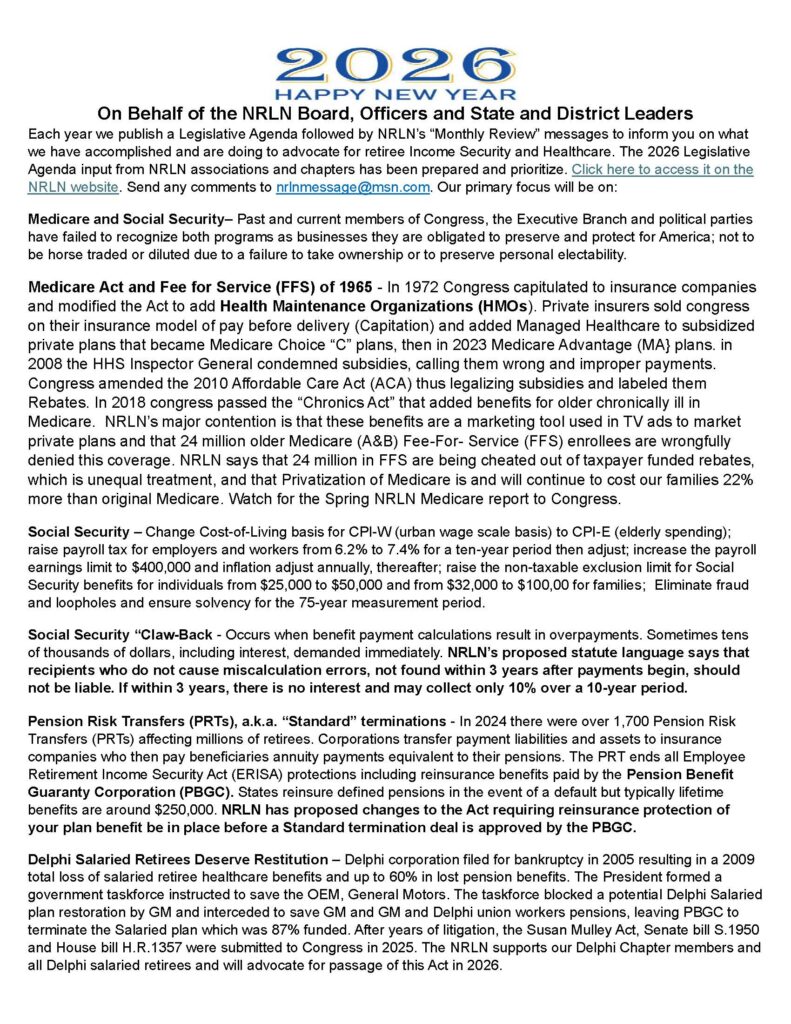NRLN President’s Forum Social Security COLA Will Be 2.8% for 2026 The Social Security Administration (SSA) announced on Friday, October 24, there would be a 2.8% Cost-of-Living Adjustment (COLA) for 2026. SSA normally announces the COLA on October 15 but was delayed due to the federal government shutdown. The COLA increase for January will add about $56 to an average monthly benefit of $2,071. Unfortunately, the standard Medicare Part B premium will take a chunk out of the COLA. It is expected to increase in 2026 by $21.50 from $185.00 per month $206.50. Many seniors with Medicare Advantage plans are likely to learn their healthcare insurance provider is increasing deductibles, copays and the maximum out-of-pocket cost. Drug deductible – the amount you pay up front before coverage kicks in – are increasing for many Medicare Part D plans. Also, in a number of plans, medications that now come with a …
President's Forum Archive
Submit your Email Address to receive Future Issues of the President's Forum
If you did not receive an email with the NRLN President’s Forum message or an Action Alert posted on this home page, possibly you mistakenly “unsubscribed” on one of our emails or you have a new email address. You will no longer hear from us unless you “re-subscribe”.
NRLN Provides New “Report Card” Feature on Members of Congress. Do your Senators or Representative support bills that help retirees?
Click the link below. When map of USA appears, click on your state. Next click on the EXCEL DOWNLOAD button and open the download when it appears.
STAY CONNECTED
Important Message!
Click here
to take NRLN Health Insurance Survey.
Click here
to read preliminary results of Survey.

Healthcare Insurance Costs Are a Struggle for Many and Expensive for Nation
The healthcare insurance costs are a struggle for many retirees and for those who do not have employer-sponsored coverage before being Medicare eligible at age 65. Medical inflation is annually adding to the nation’s debt.
Costs Begin with Premiums Paid to Medicare
The initial cost for original Medicare and Medicare Advantage is the standard Medicare Part B (medical coverage) premium of $202.90 per month in 2026, an increase of $17.90 (9.7%) from the 2025 premium of $185 The Social Security Cost-of-Living Adjustment for 2026 is 2.8%. The $17.90 increase takes a big chunk out of the average monthly 2026 COLA increase of $56. The annual deductible is $283 in 2026 up from $257 in 2025.

NRLN Grassroots Network is the name for having support from NRLN members to respond to Action Alerts plus having Region, State and Congressional District leaders to support the NRLN’s Washington, D.C. lobbying efforts.
NRLN - Your Source for Medicare Enrollment 2025
MEDICARE AND YOU HANDBOOK 2025
Two Cancer Bills That
Congress Should Pass
Multi-Cancer Early Detection
Metastatic Breast Cancer Patients’
Access to SSDI and Medicare
In the News
The articles and opinion pieces below are for information and are not necessarily a reflection of the NRLN’s position on issues.
The NRLN is nonpartisan and its positions on retirement issues are presented in its Legislative Agenda and white papers that can be accessed from under the Legislative Agenda tab on the website main menu.








